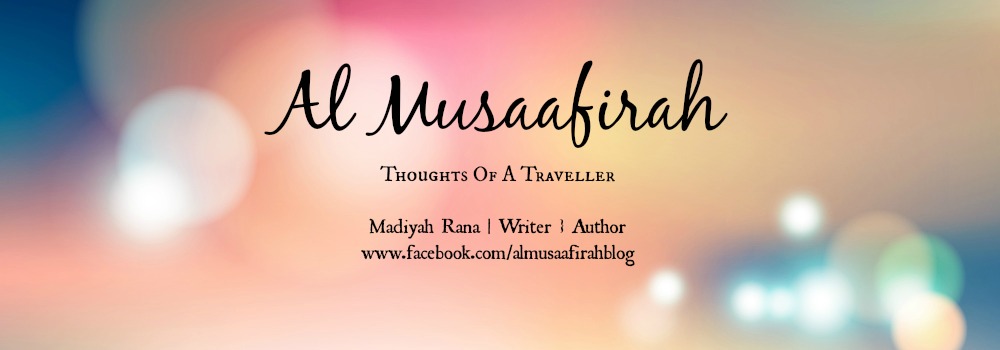Du'aa has played a huge part in my life. It's been my ultimate weapon to fight the doubts, the fears, and the confusion amidst the tests of life. There's been moments in my life, when I felt misunderstood, lost, and my thoughts were one big muddled up mess, yet, by pouring them out in sujood, to my Maker, the One who understood even my silence or my whispers, I felt rejuvenated and relieved. There's been times in my life when I've been on a crossroad, not knowing which road to take, which decision to make; all the emotions were overwhelming, yet Du'aa helped me make the correct decision, as I was able to talk to Allah, ask Him, rely upon Him, and express my deepest, darkest thoughts and doubts to Him. There's also times, when I could see no light at the end of the tunnel. Times when guilt crippled me, remorse paralyzed me, numbed me inwardly, yet somehow, He granted me the strength to muster up the courage to whisper, just whisper an external plea of help. A whisper that He heard, and so He came running to assist me, comfort me and grant me hope when I thought all hope was lost.
Du'aa is indeed a miracle. A gift bestowed upon mankind. A strong weapon of a believer to help Him fight the enemies within and the enemies outside.
When we hear the word, ‘Ramadhan’, we instantly think of the Qur’an. As much as Ramadhan is a month of Qur’an, since it was in this month that the revelation was given to the Prophet (salallahu alayhi wasallam) in the cave of Hira - it is also a month of Du’aa since that is the essence of worship. The Prophet (salallahu alayhi wasallam) himself said: “Du’aa is the essence Ibaadah.”
Also, in the Qur’an, sandwiched between the ayah of Ramadhan and the ayah of fasting, is an ayah just on Du’aa, (ayahs 185, 6 and 7 in Surah Baqarah). Yes, right in between! What does this teach us? That Ramadhan is centered around the essence of Ibaadah; Du’aa. For every act of worship we perform is a reminder of our neediness towards Allah. And what do we do when we have a need? When we’re feeling the pangs of hunger? When someone has hurt us but we have to suppress our feelings and control are tongue as to not waste the reward of our fast? We turn to Allah. We ask Him. And that’s when we find contentment, reassurance and hope..
In this post, I want to give you an insight into the way I usually write-up my Du'aa list, in the hopes that you may also benefit and create your own Du'aa book, list - whatever you want to call it :)
So, here goes.
Firstly, you will need to gift yourself (or if you're married then use your wifey tricks to get your husband to buy you one ;), a beautiful book or journal - preferably something that can slip into your jacket pocket or won't take up ample room in your handbag. If you're someone who isn't a fan of books, then you can always use an online tool or mobile app. I recommend evernote, since you can use it both from your mobile and your computer/laptop.
The reason why I placed this as number one, when you're most probably thinking it hasn't anything to do with Du'aa, is because, I feel, many of us will invest money and time in buying cool stationary when we're about to begin our school/uni year, but rarley give it a thought when it comes to anything spiritual or related. Rather, we're okay to attend talks with scraps of paper that we found in the corridor on our way out because we were running later for the local masjid halaqah!
For me personally, every notebook I own, and especially my journal is a reflection of who I am and what I love. My personal journal, in which I write my dairy, is pink, flowery with lots of pearls and swirls. It's what I like. It reflects my personality. Similarly, my Du'aa book reflects my love for Du'aa, how I find it such a beautiful gift from Allah, and thus (see picture below) I picked a mini, purple and gold notebook to store all those things I want to ask from Allah.
In short, it sets the mood and really makes you, (well me for sure!) excited to jot down all my dreams and goals and transform them into beautiful Du'aas.
Secondly, categorize your Du'aa list. Now I don't mean categorize them by colour (though if you like your colourful Stabilo pens like me, then by all means - got for it!). But I mean separating your Du'aas under the following sections:
- Dunya
- Akhirah
- Spirituality
- Others
- Superstars







